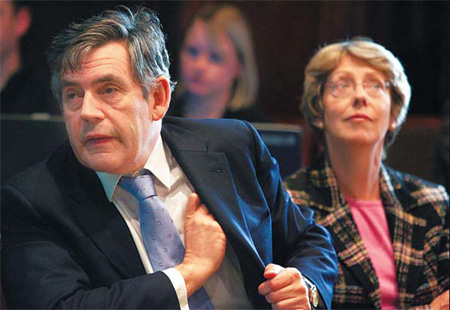Global General
Brown survives move to dump him
(China Daily)
Updated: 2010-01-08 09:32
 |
Large Medium Small |
LONDON: UK Prime Minister Gordon Brown faces fresh demands for an immediate general election after he survived an attempted backbench coup Thursday but received only lukewarm statements of support from key cabinet ministers, including the foreign secretary, David Miliband.
|
 In this March 2007 file photo, Prime Minister Gordon Brown appears with former government minister Patricia Hewitt, one of two ex-cabinet officials who tried to unseat him this week. [Agencies] |
David Cameron, the Conservative leader, and Nick Clegg, his Liberal Democrat counterpart, both said Thursday that the attempt by two former cabinet ministers to unseat Brown showed that Labour was no longer fit to govern.
| ||||
It said: "I am working closely with the prime minister on foreign policy issues and support the re-election campaign for a Labour government that he is leading."
Miliband's statement came seven hours after Patricia Hewitt and Geoff Hoon tried to stir cabinet discontent with Brown's leadership into an open rebellion.
A phalanx of key cabinet ministers eventually rallied to Brown's standard during the course of the afternoon, including Alan Johnson, Harriet Harman, Alistair Darling and Lord Mandelson.
Cameron told BBC Radio 4's Today program Thursday morning: "If ever there was a time when our country needed strong leadership and a united government, it's today. We've got this massive budget deficit, we are at war in Afghanistan, we have got deep social problems, and yet we have got a government completely divided.
"If ... the prime minister does not really have the support of his senior colleagues, people will ask: 'Why should anyone else support him?' You just have to ask yourself: 'How much time do you think senior ministers were spending Thursday thinking about the budget deficit, about the education of our children, about the war in Afghanistan, and how much were they thinking about their own futures and their own careers?' for you to realise ... that we cannot go on like this. We have got to have an election and a change of government."
Meanwhile Clegg told GMTV that the failed coup showed why the country needed a general election. "The Labour party now is more interested in talking about itself," the Lib Dem leader said.
But Mandelson told Newsnight on Wednesday night that Brown was the "best possible" leader for Labour.
"The party has reached a settled view. They want Gordon Brown to lead the party as prime minister into the general election whenever it takes place and they don't want to open the question of the leadership," the business secretary said.
Brown met many members of his cabinet before they issued their pledges of loyalty, which were offered with varying degrees of enthusiasm. But Miliband, the figure most likely to succeed Brown, maintained a sonorous silence for hours after the former chief whip Hoon and the former health secretary Hewitt raised the flag of rebellion.
The foreign secretary's allies are understood to have sent emissaries to contact the rebels to say they believed he would act if there were clearer signs that the rebellion was spreading across the parliamentary party.
Wednesday night, the BBC said it understood six cabinet ministers had signaled they would have supported a further move against Brown, while former defense minister Eric Joyce wrote on his blog that to his knowledge two cabinet ministers had promised they would act, but had not.
By Wednesday evening, though, Hoon admitted that the attempt to force a ballot appeared to have failed.
"I accept that we have set out that opportunity [to resolve the leadership issue] that Labour MPs by and large have not taken," he told the BBC's Newsnight program.
When asked by presenter Jeremy Paxman, "if you were Brutus, Caesar would have been fine, wouldn't he?" Hoon agreed.
The frenzied activity was triggered at lunchtime when Hoon and Hewitt - in a coordinated move in which they emailed all Labour MPs - called for a secret ballot to decide once and for all if Brown should lead the party into the election.
Many Labour MPs said they were disgusted with the former disciplinarian Hoon and said he had taken leave of his senses. Even some sympathetic to the move questioned the lack of preparation and the timing.
In their letter, the rebels wrote: "Many colleagues have expressed their frustration at the way in which this question is affecting our political performance. We have therefore come to the conclusion that the only way to resolve this issue would be to allow every member to express their views in a secret ballot."
But they made their move only minutes after Brown had given one of his most effective performances at prime minister's questions and hours after Mandelson had used a speech on growth to mark the end of his temporary disillusionment with his premiership.
Guardian-BBC-Independent-Reuters











